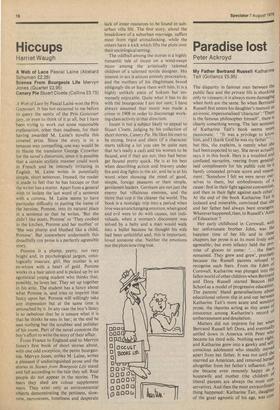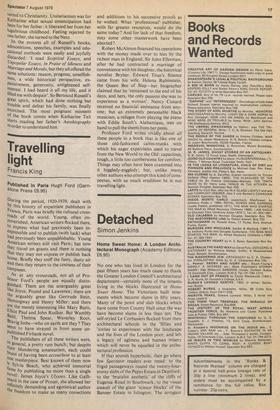Paradise lost
Peter Ackroyd
My Father Bertrand Russell Katharine Tait (Gollancz £5.95) The disparity in famous men between the public face and the private life is shocking only to voyeurs; it is always more damaging when both are the same. So when Bertrand Russell first enters his daughter's memoir as an ironic, impersonalised 'character' : 'There is the famous philosopher himself', there is clearly something wrong. The last sentence
of Katharine Tait's book seems more passionate: "It was a privilege to know him, and I thank God he was my father" '— but this, she explains, is merely what she had been expected to say. She never actuallY says it in this book. Hers is a troubled and confused narrative, veering from general' ised compliments for his public role to a barely concealed private scorn and resent' ment: 'Somehow I felt we were never ourselves to them, but embodiments of a cause: first in their fight against convention, and then in their fight against each other • At the end of the book Katharine Tait is isolated and miserable, convinced that she and her father had always been strangers. Whatever happened, then, to Russell's 'Ainis of Education'?
Her early childhood in Cornwall, with her unfortunate brother John, was the happiest time of her life and in these chapters her prose is at its most lively and agreeable; but even infancy held the Pe°' mise of gloom to come: '... the fears remained. They grew and grew', preciselY because the Russell parents refused recognise such fears. From the Eden 01 Cornwall, Katharine was plunged into the fallen world of other children when Bertrand and Dora Russell started Beacon Hill School as a model of progressive education. The parents' bland generalisations about educational reform slip in and out between Katharine Tait's more acute and sensitive. prose, the theories acting as tiny areas 01, innocence among Katharine's record 01 embarrassment and desolation.
Matters did not improve for her wheli Bertrand Russell left Dora, and eventuallY settled down in America with Peter ‘vhd became his third wife. Nothing went righ,t' and Katharine grew into a gawky and sell; conscious adolescent who steadily move° apart from her father. It was not until She married an American, and removed hersell altogether from her father's influence, that she became even remotely happy asaf housewife and mother (the children 0' liberal parents are always the most con' servative). And then the most extraordinarY thing happened: Katharine Tait, daughter of the great agnostic of his age, was con
verted to Christianity. Unitarianism was for Katharine what sexual emancipation had been for her father: it liberated her from her lugubrious childhood. Feeling rejected by one father, she turned to the Next.
In the process all of Russell's books, admonitions, speeches, examples and educational methods were easily and joyfully discarded: 'I read Sceptical Essays, and Unpopular Essays, In Praise of Idleness and Marriage and Morals, but they all offered the same solutions: reason, progress, unselfishness, a wide historical perspective, exPansiveness, generosity, enlightened selfinterest. I had heard it all my life, and it filled me with despair'. So Bertrand Russell's great spirit, which had done nothing but trouble and defeat his family, was finally exorcised. The most poignant moment of the book comes when Katharine Tait starts reading her father's Autobiography in order to understand him.



























 Previous page
Previous page